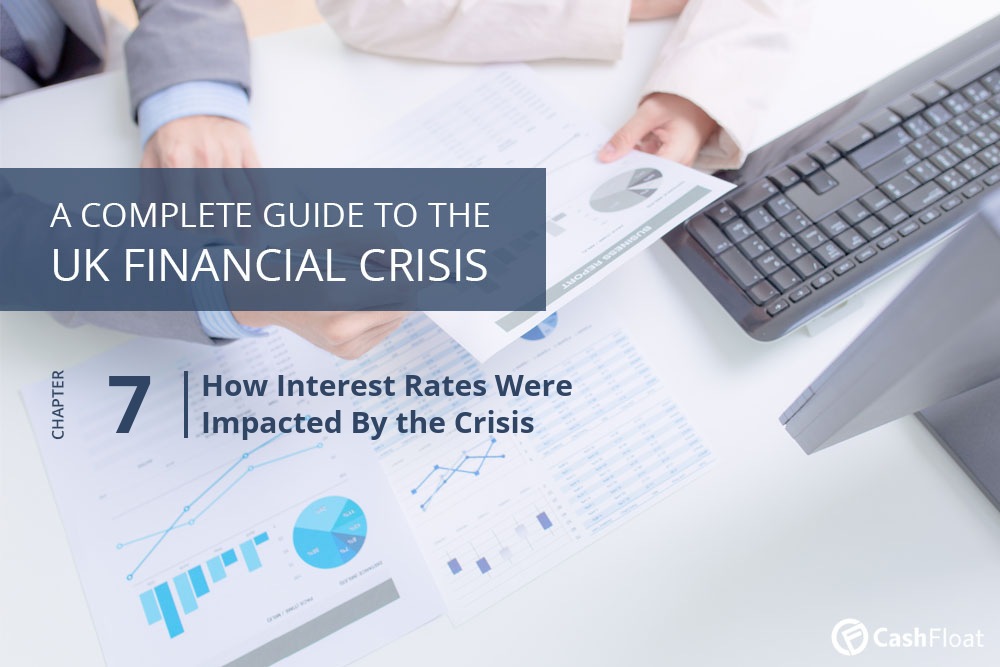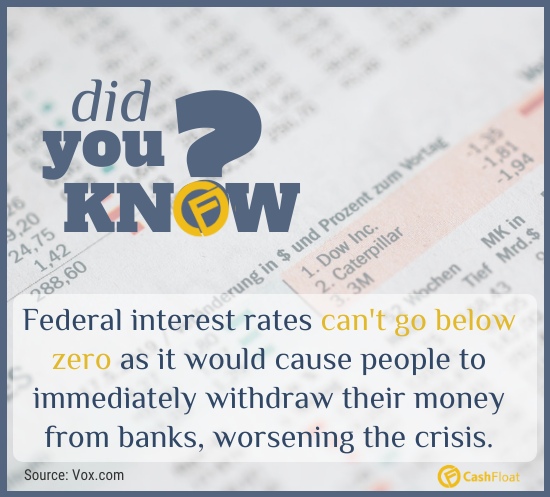The History of The Financial Crisis in the UK – Chapter 7
Interest rates influence every aspect of the financial sector, from mortgages to business loans. The financial crisis’s far-reaching effects reached interest rates as well. Cashfloat, your trusted payday lender discusses how the financial crisis affected interest rates in the UK.

How Did the Crisis Affect Interest Rates?
Raising and lowering interest rates has been central to controlling the economic growth in all developed countries. Each economy has a natural rate of interest that is determined by the amount of saving and investments. Lowering the natural rate will reduce the cost of borrowing, which stimulates borrowing, investment and growth. Before the financial crisis of 2008, the head of a central bank would try to prevent a boom and bust scenario by attempting to keep inflation rates low and stable. If inflation starts to rise too quickly, the bank will increase the interest rate slightly, which would discourage too much borrowing. And, if the economy needed more growth, banks would lower interest rates slightly to encourage borrowing, spending and commerce. Monetary policy using interest rates had hummed along nicely for several decades before the great credit crunch.
Who is to blame for the impact on rates?
Some have blamed China for the extremely low interest rates in the US before the crash. China had invested heavily in the US subprime mortgage market, which drove rates down. These mortgages targeted people with bad credit and few assets who were unlikely to get approved for a large loan. The increase of available credit at good rates and the rise in house prices meant that many saw an opportunity to make easy money. As rates continued to drop despite low inflation, people flooded the financial market borrowing recklessly, and not considering the consequences if rates would rise in the future.

From June 2004 interest rates in the US started to rise and by 2006 the rate was 5.25%. This brought rates up a full 1.00% from 2003. Many families who had taken out mortgages in 2003 soon found that they could not make their repayments in full and on time. The subsequent crash in the housing market led to a 40% decline in construction during 2006. Defaults became commonplace, which caused many subprime mortgage companies to file for bankruptcy. There were 25 companies during February and March 2007 that failed.
Consumerism & Interest rates
Once the credit bubble burst, a steep recession took hold. There was an immediate downturn in consumer spending, house purchases and pretty much all non-essential buying. Global central banks got together to decide on a policy to prevent further mayhem in the financial world. They tried both conventional and unconventional methods to stop the rot that had seeped into the financial system. The US federal bank started cutting the interest rates, but unfortunately, several big banks came under threat. These were Lehman’s which went under, Bear Stearns which was bought out by JP Morgan Chase and Merrill Lynch which was acquired by Bank of America. The US Fed took over Fannie Mae and Freddie Mac, companies which had nearly gone bankrupt as well.

Both the federal fund’s interest rate and the discount rate were reduced substantially to 1.00% and 1.75%. The federal funds rate is what large banks use when they lend to other smaller banks that require funds over a short period. The discount rate is what the federal bank charges large banks. The national rate cut was supposed to reduce the repayments for mortgages, credit cards and personal loans. Central banks throughout the world followed suit, slashing their crisis-affected interest rates to try and stop the financial earthquake that appeared to have a life of its own.
Conclusion – How have Interest Rates Affected the Economy?
Low interest rates reduce the cost of borrowing, which stimulates borrowing, investment and growth. Low interest rates also encourage banks’ capacity to lend. However, during the financial crisis, banks refrained from lending due to low reserves. Additionally, they were afraid that their bank would be the next to fail.
Of course, there are downsides to low rates too. Low interest rates were an important factor in causing the mass of subprime mortgages in the five years before the crash. In addition, low rates mean that serious investors will flock to higher yield products like commodities, gold, silver and oil. Investing in these products does not boost the economy as directly as buying retail products and consumerism.

Despite continued low interest rates, the US economy has still not fully recovered. Short term loans have been at almost zero per cent interest since 2008. The government has also used the policy of quantitative easing in addition to the low interest rates. The fed bought bonds to create new money which in theory should help stimulate the economy. Nevertheless, the US is not yet completely out of the woods.



